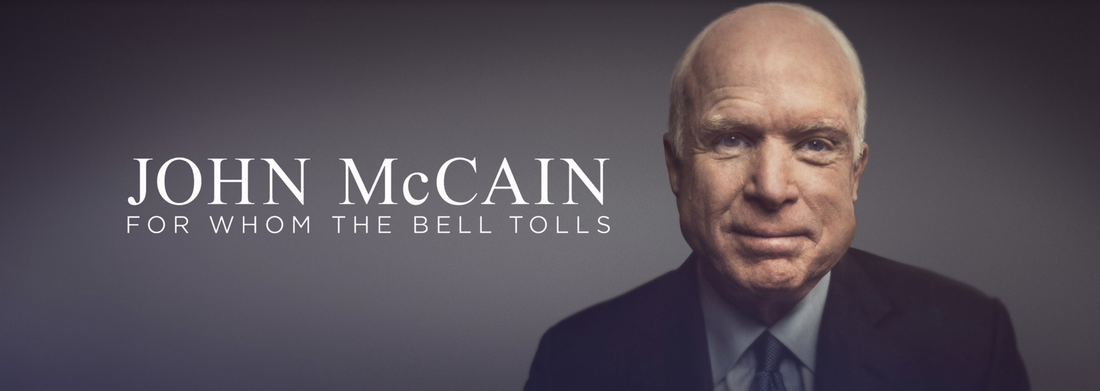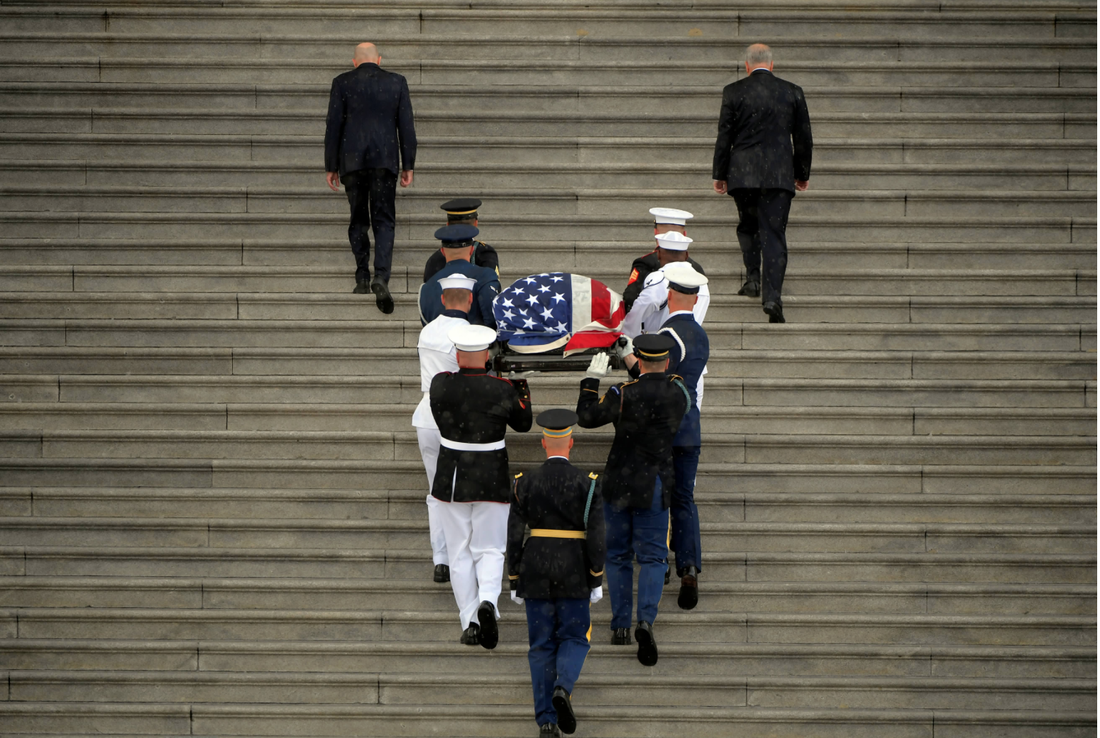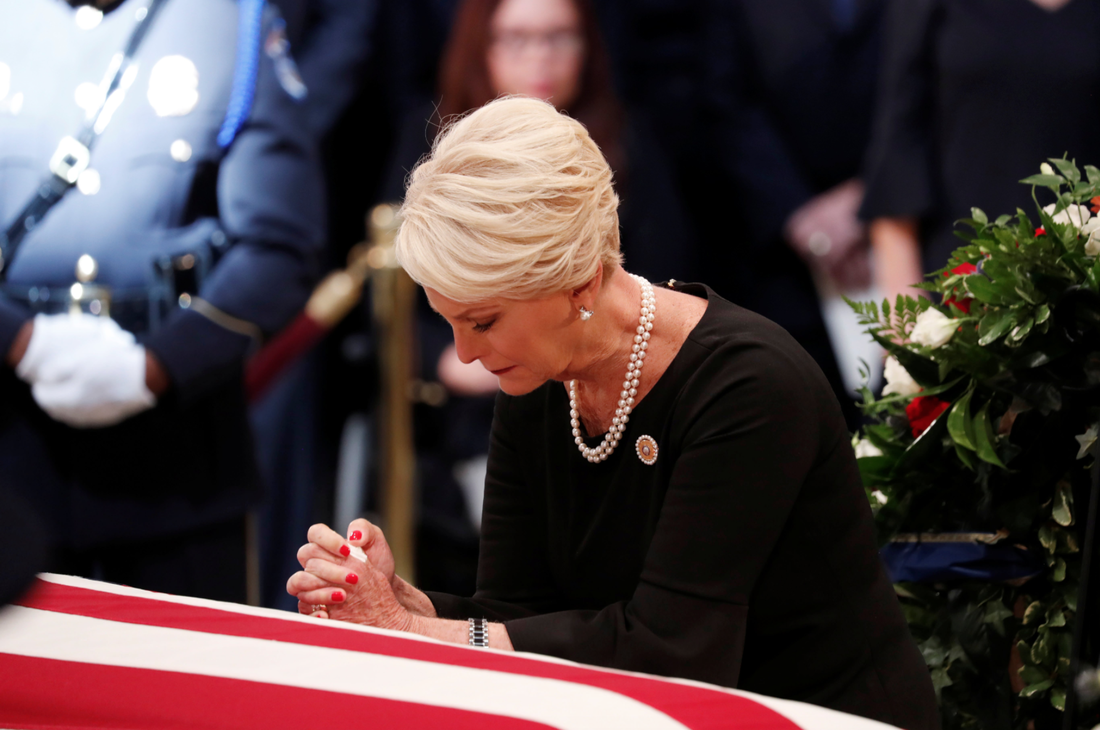|
Filmmaker Teddy Kunhardt calls Trump's response to McCain's death 'disappointing': 'I was deeply offended when President Trump raised [the flag]' at the White House As the nation bids farewell to Senator John McCain this weekend, millions around the country will follow his funeral services on television. No one will be watching with greater interest, or emotion, than filmmaker Teddy Kunhardt. He was the last person to interview McCain in depth on camera. "He's just a good guy. He's a guy you'd want to sit and talk to and have a beer with," Kunhardt tells Nonfictionfilm.com. "There was no BS, there was no pretense, there was no anything." He wanted to use this film... as a way to unite, not divide. Kunhardt got to know the Senator in the last months of his life, as he, along with his father Peter and brother George, directed the HBO documentary John McCain: For Whom the Bell Tolls. The project came together at lightning speed, shortly after McCain revealed his cancer diagnosis in July 2017. "The news broke that Sen. McCain had glioblastoma. I talked about it with Peter and George... That night we emailed HBO," Kunhardt recalled. "And within the next morning we had the green light and it was, 'Let's do this.'" McCain himself knew it would be imperative to complete interviews for the film before his health deteriorated. "We were down there [in Arizona] three weeks after the diagnosis," Kunhardt noted. "He knew with this cancer diagnosis from seeing [Sen.] Ted Kennedy die of the same cancer and Beau Biden [son of former Vice President Joe Biden] die of the same cancer he wasn't naive to believe he could survive it. He fought it hard but he knew that death was imminent... He was in a reflective state." McCain reflected on dedicating his life in service to the nation, first as a Navy pilot. During the Vietnam War his plane was shot down and he nearly lost his life before he was taken prisoner by North Vietnamese forces. He would remain in the 'Hanoi Hilton' for over five years, often enduring brutal torture. After the end of the war he would get a taste for politics through experience as a military liaison to the U.S. Senate. He was already contemplating a possible political career in the late 1970s, when his marriage to Carol McCain faltered. By the time his divorce became final he had met and fallen in love with Cindy Lou Hensley, a schoolteacher from a wealthy family. 'He said, 'I want this [film] to show my warts and all,'" Kunhardt remembered. "And one of his warts was his divorce from his first wife, Carol. And we said to him, 'Look, we view this divorce as a major turning point in your life and your kids' life, would you put us in touch with Carol?' And without hesitation he said, 'Done. I'll call her up and ask her if she'll participate.'" She did participate, as did his daughter Sydney by his first wife. Among the other interviewees in the film are his second wife, Cindy McCain, two of their children, as well as close friends and aides, Senate friends Joe Lieberman and Lindsay Graham and former presidents Bill Clinton, George W. Bush and Barack Obama. It was Bush who denied McCain the Republican nomination for president in 2000 and it was Obama who defeated McCain for president in 2008. Despite their roles in keeping him from occupying the Oval Office, McCain wanted the two men to speak at his funeral on Saturday. "This is a perfect example of McCain. Here are the two guys that beat him -- what better way to show this polarized country that we can all get along? To have Obama and to have Bush be his speakers in and of itself says so much about the man," Kunhardt commented. "He could have easily just stuck with Republicans. He could have just had Lindsay Graham and Joe Lieberman. But instead he thought bigger and I think it's a great testament to his legacy, to himself, to his family and to this country." One who will be notably absent from the National Cathedral, site of the funeral, is President Trump. McCain didn't want him there. McCain scripted the service to put an emphasis on bipartisanship, a rebuke of the way Trump has governed. His goal for the documentary was similar, Kunhardt says. "We said, 'Okay, Senator McCain, if you could achieve anything from this film what would it be?'" the director recalled. "And he said, 'I hope you can inspire my colleagues to work together. It wasn't that long ago when we could work across the aisle and I really think that it can happen again and I hope that the audience will understand that as well.'" During the Republican primary campaign, Trump famously impugned McCain's military record. "He’s not a war hero,” candidate Trump declared in 2015. “He was a war hero because he was captured. I like people who weren’t captured.” It might be expected the directors would put that sequence in their documentary, but they opted not to. "We decided not to include President Trump in the film. He sucked the air out of the viewer and he detracted from the message of unity that McCain stands for," Kunhardt stated. "We definitely tried editing with Trump in it and we just felt it detracted and didn't add. It's a positive message of unite, not divide." Kunhardt says on a personal level he is disconcerted by how President Trump has responded to Sen. McCain's death. The president initially sent out a tweet offering condolences to the McCain family, but reportedly nixed distributing a statement that would have expressed gratitude for his service in the military and in Congress. The flag was first lowered at the White House out of respect for McCain, but then quickly raised the next day -- even as other federal institutions kept their flags at half-staff. It was only lowered again under pressure from veterans groups. "As a non-filmmaker, as a citizen, as a friend of John's, I was disappointed [by the president's response]. I don't agree with it," Kunhardt said, adding, "I was deeply offended when President Trump [raised] the flag [at the White House] after the next day. But he redeemed himself after he raised it by lowering it back." I asked, 'Are you afraid to die?' He said, 'No, I'm not afraid to die. I've escaped death before. Probably won't escape it this time.' John McCain: For Whom the Bell Tolls is available for viewing on HBO Now and HBO Go. Kunhardt was able to screen it for the Senator some months ago, while McCain was in the hospital undergoing treatment for a stomach ailment.
"I hadn't seen him since the fall of 2017. And when I saw him [then] he looked a little frail but he was good. He was walking, he was healthy. So it was shocking to see him in the hospital bed and emaciated," Kunhardt acknowledged. "It was very emotional and sad but he was in good spirits. He loved what he saw. He grabbed my hand at the end and said, 'You nailed it.' As sad as it was, it was also rewarding to be able to show him our sweat and labor of seven and a half months." The film delves frankly into mistakes McCain felt he had made over the course of his career, including his failure before the Republican primary in South Carolina in 2000 to oppose the flying of the Confederate Flag above the State Capitol building. He later made his feelings clear that the flag should be removed. "I think [New York Times columnist] David Brooks hits it best in the film [saying], 'Look, he's got an interior moral compass. McCain knows when he's wrong. He knows when he screwed up and it doesn't sit well with him,'" Kunhardt says. "When he folds and talks about the flag in South Carolina he knows what he's doing is wrong. But what politician today would -- after losing the election for the nomination -- go back and apologize? I can't think of any." Kunhardt expresses admiration for another key moment in McCain's career, when he reached across the aisle to redefine U.S.-Vietnam relations. "What really struck a chord was all these years after he had been tortured he was a spearhead for the Vietnam normalization and that he could forgive and mend a relationship that was absolutely devastating," Kunhardt tells Nonfictionfilm.com. "I think it just speaks volumes that he could, singlehandedly -- with the help of John Kerry and [President] Clinton -- manage to pull that off. I'm glad that the film was able to clarify that for future generations, that it wasn't just his heroic behavior as a POW and as a fighter pilot but as a person who bridged the gap between Vietnam and the United States many years later." If that effort can teach us something about reconciliation, the way McCain responded to his final illness shows us how to approach death with courage. "He handled his death the way he handled his life, a step at a time," Kunhardt observes. "I think his death forced him to look in the rearview mirror a little more than he wanted to. I know he spent a lot of time with his family. I know he spent a lot of time at Sedona at his beloved ranch. I asked, 'Are you afraid to die?' He said, 'No, I'm not afraid to die. I've escaped death before. Probably won't escape it this time, but it is what it is.' He's from a family of admirals. This guy is fearless. I think he tried to fight this cancer diagnosis and in the end he knew it was not a fight that he could have a fair chance of winning. But I think he gave it his all." |
AuthorMatthew Carey is a documentary filmmaker and journalist. His work has appeared on Deadline.com, CNN, CNN.com, TheWrap.com, NBCNews.com and in Documentary magazine. |
- Home
- News
- Videos
-
Galleries
- 2019 Tribeca Film Festival
- Full Frame Documentary Film Festival
- 2019 SXSW Film Festival
- SXSW 2018 Gallery
- 2019 Sundance Film Festival
- Outfest 2018 Photo Gallery
- Outfest 2017
- Sundance 2018 Photos
- 2017 LA Film Festival
- 2017 Cannes Film Festival
- Tribeca Film Festival 2017
- SXSW 2017 Gallery
- 2017 Berlin Film Festival
- Sundance 2017 Gallery
- 2016 Los Angeles Film Festival
- Cannes Film Festival 2016
- SXSW 2016 Gallery
- Berlinale 2016 Gallery
- Sundance 2016 Gallery
- Filmmaker Gallery
- About
- Contact
Proudly powered by Weebly
- Home
- News
- Videos
-
Galleries
- 2019 Tribeca Film Festival
- Full Frame Documentary Film Festival
- 2019 SXSW Film Festival
- SXSW 2018 Gallery
- 2019 Sundance Film Festival
- Outfest 2018 Photo Gallery
- Outfest 2017
- Sundance 2018 Photos
- 2017 LA Film Festival
- 2017 Cannes Film Festival
- Tribeca Film Festival 2017
- SXSW 2017 Gallery
- 2017 Berlin Film Festival
- Sundance 2017 Gallery
- 2016 Los Angeles Film Festival
- Cannes Film Festival 2016
- SXSW 2016 Gallery
- Berlinale 2016 Gallery
- Sundance 2016 Gallery
- Filmmaker Gallery
- About
- Contact




 RSS Feed
RSS Feed